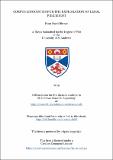Files in this item
Corpus linguistics for the exploration of legal precedent
Item metadata
| dc.contributor.advisor | Quigley, Aaron John | |
| dc.contributor.advisor | Nacenta, Miguel | |
| dc.contributor.author | Brown, Evan David | |
| dc.coverage.spatial | xii, 358 p. | en_US |
| dc.date.accessioned | 2019-07-29T08:41:04Z | |
| dc.date.available | 2019-07-29T08:41:04Z | |
| dc.date.issued | 2019-07-17 | |
| dc.identifier.uri | https://hdl.handle.net/10023/18188 | |
| dc.description.abstract | A deterioration of legal research skills has become a critical issue for lawyers. This thesis examines the causes of the problem under English law and specifically addresses how current technology for legal research contributes to or ameliorates the skills deficit. England has a "common law" system where the state of the law is determined by precedents laid down in previous cases. This linkage between cases means that lawyers have to assimilate a large amount of written language in order to understand the key elements of prior judgements. There are approximately two million criminal cases and another two million civil cases heard in England each year, from which the important decisions are reported. This thesis first analyses the way in which lawyers work in conducting legal research. The findings indicate that the move online has improved access to legal information but it has compromised the ability of practitioners to identify high-quality precedent and to discard information which is not relevant. A side-effect is the marginalisation of trained law librarians and their curation skills which contributes to the problem. Existing platforms prioritise comprehensive data coverage over delivering a curated research environment. A need to better train lawyers in the skills of critical thinking and linguistic analysis through computer-based tools is identified. This thesis proposes that linguistic analysis techniques from the domain of corpus linguistics can help. Single-context legal research tools which minimise the need to switch between different applications are also required. Effective working is currently compromised by having to navigate between many different tools. The development of effective collaboration skills is of particular importance. Lawyers must work well in teams in order to prepare cases effectively. The Legal Research and Collaboration platform is the prototype application which results from this research. It is a software system for legal research within teams of lawyers. Experiments establish how effectively LARC works for both practising lawyers and for law students. A foundation for future work is laid because the software is entirely open source and is based upon open access legal data. The results show that critical barriers which result in poor legal research skills can be ameliorated by well-designed computer-based tools. | en_US |
| dc.language.iso | en | en_US |
| dc.publisher | University of St Andrews | |
| dc.rights | Creative Commons Attribution-NonCommercial-NoDerivatives 4.0 International | * |
| dc.rights.uri | http://creativecommons.org/licenses/by-nc-nd/4.0/ | * |
| dc.subject | Corpus | en_US |
| dc.subject | Linguistics | en_US |
| dc.subject | Legal | en_US |
| dc.subject | Technology | en_US |
| dc.subject | Lawyer | en_US |
| dc.subject | Precedent | en_US |
| dc.subject | Visualization | en_US |
| dc.subject | Analysis | en_US |
| dc.subject | Research | en_US |
| dc.subject | Skills | en_US |
| dc.subject.lcc | KD394.B8 | |
| dc.subject.lcsh | Law--England--Research--Data processing | en |
| dc.subject.lcsh | Corpora (Linguistics)--Data processing | en |
| dc.title | Corpus linguistics for the exploration of legal precedent | en_US |
| dc.type | Thesis | en_US |
| dc.contributor.sponsor | University of St Andrews | en_US |
| dc.type.qualificationlevel | Doctoral | en_US |
| dc.type.qualificationname | PhD Doctor of Philosophy | en_US |
| dc.publisher.institution | The University of St Andrews | en_US |
| dc.identifier.doi | https://doi.org/10.17630/10023-18188 |
The following licence files are associated with this item:
This item appears in the following Collection(s)
Except where otherwise noted within the work, this item's licence for re-use is described as Creative Commons Attribution-NonCommercial-NoDerivatives 4.0 International
Items in the St Andrews Research Repository are protected by copyright, with all rights reserved, unless otherwise indicated.


